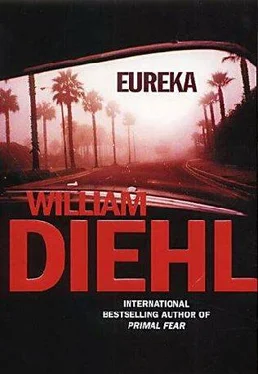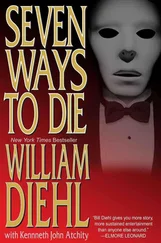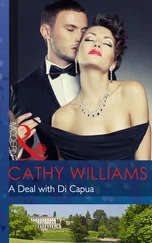William Diehl - Eureka
Здесь есть возможность читать онлайн «William Diehl - Eureka» весь текст электронной книги совершенно бесплатно (целиком полную версию без сокращений). В некоторых случаях можно слушать аудио, скачать через торрент в формате fb2 и присутствует краткое содержание. Жанр: Полицейский детектив, на английском языке. Описание произведения, (предисловие) а так же отзывы посетителей доступны на портале библиотеки ЛибКат.
- Название:Eureka
- Автор:
- Жанр:
- Год:неизвестен
- ISBN:нет данных
- Рейтинг книги:5 / 5. Голосов: 1
-
Избранное:Добавить в избранное
- Отзывы:
-
Ваша оценка:
- 100
- 1
- 2
- 3
- 4
- 5
Eureka: краткое содержание, описание и аннотация
Предлагаем к чтению аннотацию, описание, краткое содержание или предисловие (зависит от того, что написал сам автор книги «Eureka»). Если вы не нашли необходимую информацию о книге — напишите в комментариях, мы постараемся отыскать её.
Eureka — читать онлайн бесплатно полную книгу (весь текст) целиком
Ниже представлен текст книги, разбитый по страницам. Система сохранения места последней прочитанной страницы, позволяет с удобством читать онлайн бесплатно книгу «Eureka», без необходимости каждый раз заново искать на чём Вы остановились. Поставьте закладку, и сможете в любой момент перейти на страницу, на которой закончили чтение.
Интервал:
Закладка:
But O’Dell owned the six square blocks that included the town of Eureka.
“Something the matter, Del?” Ben asked.
“You know what’s the matter,” she chided, still looking at Brodie.
Ben thought for a moment and said, “Is this about the game?”
She finally glared at him but did not answer.
“That’s between my father and yours,” Ben said quietly. “We’ve all been friends since I can remember. What’s it got to do with us?”
“Yes.” Isabel nodded. “I agree.”
“My father says we’ll have to leave if he loses. But he won’t lose.” Delilah looked at Brodie and her full lips curled into a slight smile. “When he was young he played poker for a living. Over in Denver.”
“I don’t know whether my father can even play poker,” Ben said.
“So when he loses,” Del said with a snicker, “will you leave?”
“Mr. Eli hasn’t talked about it,” Brodie interrupted.
“He’s the only one in town who hasn’t,” said Isabel. She looked at Ben and said, “Aren’t you worried?”
“It’s not for our houses, just the land in the valley.”
Del looked down and picked at her skirt. Her tone became more plaintive. “Daddy has such a terrible temper. He said if that old.. if Mr. Eli wins… he’ll leave on the spot and go back to San Francisco and never set foot here again, and Mother and I will follow as soon as school ends.”
“I’m sorry it’s come to that, Del,” said Ben.
“Me, too,” Brodie said. “But we can’t do anything about it. Just wait and see what happens.”
Ben reached down and squeezed Isabel’s hand.
“We gotta go. It’s dinnertime.”
She nodded and looked at Brodie, who wheeled his horse around as he touched the bill of his cap.
“See you at school tomorrow,” he said over his shoulder.
Noah snapped his whip and the surrey moved up the road toward Grand View. Delilah looked back as they pulled away, her eyes fixed on Brodie’s back as the two boys headed toward home.
The only time Brodie ever saw Eli Gorman in less than business attire was on Sunday at lunch when he sometimes wore a silk smoking jacket. Even then, he wore a tie. Short and somewhat stubby, his heavy-lidded but steady brown eyes never wavered, alert and always interested. He spoke in a deep, level voice, which he rarely raised, even in anger. His face was thick-featured, topped by thinning black hair, and concealed behind a graying mustache and goatee. Most people found his appearance intimidating.
In business he was tough but fair, a shrewd, well-informed, quiet fox who had attended some of the finest schools in Europe and emigrated to the United States with his father, a banker. He mastered the English language, had not a whit of an accent. At twenty-one, he attached himself as an intern to Andrew Carnegie, the powerful steel magnate, who later moved him into the railroad business, where Gorman proved a wily match for the robber barons who controlled the network of trunk lines that criss-crossed the country. In his mid- thirties, Gorman found himself in San Francisco, comfortably rich thanks to a generous inheritance and artful investments in his burgeoning business.
It was there he finally began to enjoy life. He met and, after a year of ardent courtship, married Madeline Lowenstein, the tall, handsome, cultured daughter of a wealthy shipping magnate. Maddy gently sanded off his rough edges and they idolized their son, Ben, who had come late in both their lives. Then fate had led Eli to robber baron Jesse Milstrum Crane, to the Frisco-Los Angeles railroad fiasco, and, ultimately, to his unfortunate partnership with Shamus O’Dell.
Now, at fifty, the old fox was a man whose persona was dictated by tradition. In his religion, ethics, family, and friendships, his life was stable and comfortable, if somewhat ritualized. He tried to keep his business run the same way. But now, uncharacteristically, he was about to risk his ownership of half the valley in a poker game that would pit O’Dell’s greed against his vision.
Madeline knew about the game and supported his decision. And the boys knew about the game because it was a topic of gossip all over the valley. But it was not a subject Eli discussed openly with his family.
Eli stared across the elegant dining table at Ben and Brodie as the evening prayers began. Eli was inspired by their friendship, which transcended social standing, by Ben’s ability to see the value of this young boy, toughened by the streets of Eureka but with an innate sense of honesty and loyalty. And Brodie was smart, no longer brandishing the hard-boiled attitude he first had shown that day four years ago when Ben had brought him home-a tattered ragamuffin whose mother was a washerwoman. Eli was proud that Brodie saw and admired the same values of trust and friendship in Ben. When Brodie’s mother died of lung fever four months later, Eli had unofficially adopted the boy, given him a room over the stable, and paid him five dollars a week to groom the horses.
Brodie was grateful for his new life and showed it in many ways. Every Friday, starting at sundown, he voluntarily performed or directed the chores of the servants during the twenty-four hours devoted to prayer and atonement during which all other activities were forbidden to Jews. When Brodie had been invited to share meals with the family, it was his choice to wear a yarmulke-a voluntary act that deeply touched Eli.
When the prayers were over, Eli piled food upon Maddy’s fine china plates and passed them around. He sat at the head of the table wearing a prayer shawl, his pince-nez perched on the bridge of his nose.
“So what were you two up to after school?” Mr. Eli asked as he chewed a mouthful of meat loaf.
A little too casual, Brodie thought. The old fox knows.
“We had a little problem in Eureka,” he blurted, before Ben could avoid the truth.
Ben winced but was speechless. Eli looked up and stared at his son. His tone was quiet but firm. “What were you doing in Eureka?”
“We went to the pharmacy to get a soda.”
“There’s a soda shop up here on the Hill.”
“We were real thirsty, Papa,” Ben said. “We played baseball for two hours.”
“You don’t know enough to take a canteen? A bottle of water?”
“We shared it with the kids from Milltown, sir,” Brodie pitched in. “They didn’t have none.”
“ Any. Not none. The word is any.”
“Yes, sir, any,” Brodie said.
“Then what?”
“There was a… uh… mix-up,” Ben said.
“What kind of mix-up? Did you have words with somebody?”
“Yes, sir,” said Ben.
“Harsh words?”
Ben nodded.
“So harsh they gave Thomas a bruise over his eye? Words that fly through the air and make an eye black-and-blue?” Eli was the only one who called Brodie by his given first name.
“It was a fight, sir,” Brodie said. “With a guy named Guilfoyle.”
“He called me a kike,” Ben said.
Maddy looked down at her plate, embarrassed by the bigoted remark.
Eli took another bite of food.
“And you stood up for Benjamin?” Eli said to Brodie.
Brodie looked down at his lap. “He said it to me, not Ben. Besides, Ben, he does the thinkin’ and I… uh… I do the.. ”
“Fightin’?” Eli said, mimicking Brodie’s tough talk. “Brains and brawn, that it?”
“That’s about it, sir.”
“Look at me, Thomas. Don’t look away, that’s a sign of weakness. Always look a person straight in the eye.”
“Yes sir,” Brodie answered and fixed his gaze on Mr. Eli’s dark brown eyes.
“You’re a very bright young man, Thomas. A bit impetuous, but that’s the Irish in you. Don’t undersell yourself. Just because you’re handy with your fists doesn’t mean you’re stupid.”
Читать дальшеИнтервал:
Закладка:
Похожие книги на «Eureka»
Представляем Вашему вниманию похожие книги на «Eureka» списком для выбора. Мы отобрали схожую по названию и смыслу литературу в надежде предоставить читателям больше вариантов отыскать новые, интересные, ещё непрочитанные произведения.
Обсуждение, отзывы о книге «Eureka» и просто собственные мнения читателей. Оставьте ваши комментарии, напишите, что Вы думаете о произведении, его смысле или главных героях. Укажите что конкретно понравилось, а что нет, и почему Вы так считаете.












